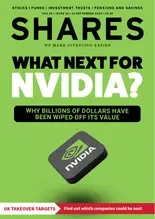
It has been a highly volatile start to May on Wall Street. An initial relief rally in stocks after the US Federal Reserve raised rates in line with expectations by 0.5% and signalled 0.75% increases were off the table for now, gave way to fears over inflation and a possible recession.
This was reflected in the worst day for the US markets since 2020 (5 May) with the tech-heavy Nasdaq index down 5%. It wasn't all bad news for technology companies. Software engineering firm EPAM Systems (EPAM:NYSE) topped the list of S&P 500 performers over the past week as it beat expectations - delivering earnings per share of $2.49 which was $0.72 ahead of expectations.
Sportswear firm Under Armour (UA:NYSE) found little protection from a market barrage as it posted sales below expectations and chalked up an unexpected loss. The company has been hit by supply chain issues and Covid lockdowns in China.
Strong US natural gas prices, as Europe turned away from Russian imports, helped lift the energy sector.
BERKSHIRE HATHAWAY
This year's annual shareholder meeting in Omaha was notable for several reasons, including details of $51 billion worth of new investments, a strike by unions and a crucial leadership vote.
Investors packed into the arena to hear about Berkshire Hathaway's (BRK.A:NYSE) purchase of insurer Alleghany (Y:NYSE) for $11.6 billion or 1.26 times book value, the firm's biggest deal since 2016.
They also wanted an update on Berkshire's $15 billion investment in preferred shares and warrants of oil giant Occidental (OXY:NYSE) and its $26 billion stake-building in rival Chevron (CVX:NYSE).
The Sage of Omaha contrasted his long-term view with the ‘gambling’ mentality of Wall Street, saying the decision to invest heavily during the quarter was ‘not because we're smart, it's because we're sane’.
He did however admit to jumping on board Activision (ATVI:NASDAQ) shares and amassing a 9.5% stake after Microsoft (MSFT:NYSE) announced in January it would acquire the company.
Outside the venue, union members at Berkshire's Burlington Northern Santa Fe railroad protested over new employment rules, while inside the shareholder proposal to introduce an independent chairman was easily defeated thanks to Buffett's personal 32% share of the voting shares.
Investors barely reacted to the first-quarter results, which showed earnings per share halving due to Covid restrictions and supply chain disruptions.
EBAY/ETSY
The writing was on the wall for investors after Amazon's (AMZN:NASDAQ) first-quarter earnings shone a light on how demand for ecommerce has dropped since the pandemic-induced boom. Both Ebay [EBAY:NASDAQ) and Etsy (ETSY:NASDAQ) posted better-than-expected first-quarter results after the bell on Wednesday (4 May), but both companies gave weak guidance for the current quarter that suggests that the online shopping sector is cooling off.
Both saw their share prices plunge as the warnings of recession got that bit louder, Ebay falling 12%, Etsy 17% off. Online peers Shopify (SHOP:NYSE) and Wayfair (W:NYSE) also fell heavily.
Etsy saw its sales rise only 5.2% from a year ago, marking the first time revenue grew in the single digits, while revenue at Ebay fell 17.9% year-over-year to $2.48 billion. Etsy said it expects second-quarter revenue to come in between $540 million and $590 million, way below the $628 million analysts had been forecasting.
BOOKING HOLDINGS/EXPEDIA
Shares in the owner of travel booking platform Booking.com, Booking Holdings (BKNG:NASDAQ), jumped 9% after the firm posted adjusted net earnings of $3.90 per share for the quarter to March, compared with a forecast of $1.18 and a loss of $5.26 per share last year, as the travel industry rebounded.
Gross bookings surged almost 130% from a year earlier to $27.3 billion for the quarter, while revenues rose to $2.7 billion against a forecast of $2.5 billion and $1.14 billion last year.
Despite showing a significant improvement, rival travel platform Expedia (EXPE:NASDAQ) received a much less enthusiastic reception to its first quarter results with the shares losing 14% of their value.
Losses per share were trimmed from $2.02 to $0.47 on revenues of $2.25 billion, in line with market forecasts, and the firm said it was seeing ‘positive indicators for a strong recovery in leisure travel this summer’.
Some analysts seemed unimpressed, however, and the report was met with a raft of downgrades and a wave of selling.
DISCLAIMER: AJ Bell is the owner and publisher of Shares. Tom Sieber owns shares in AJ Bell.




